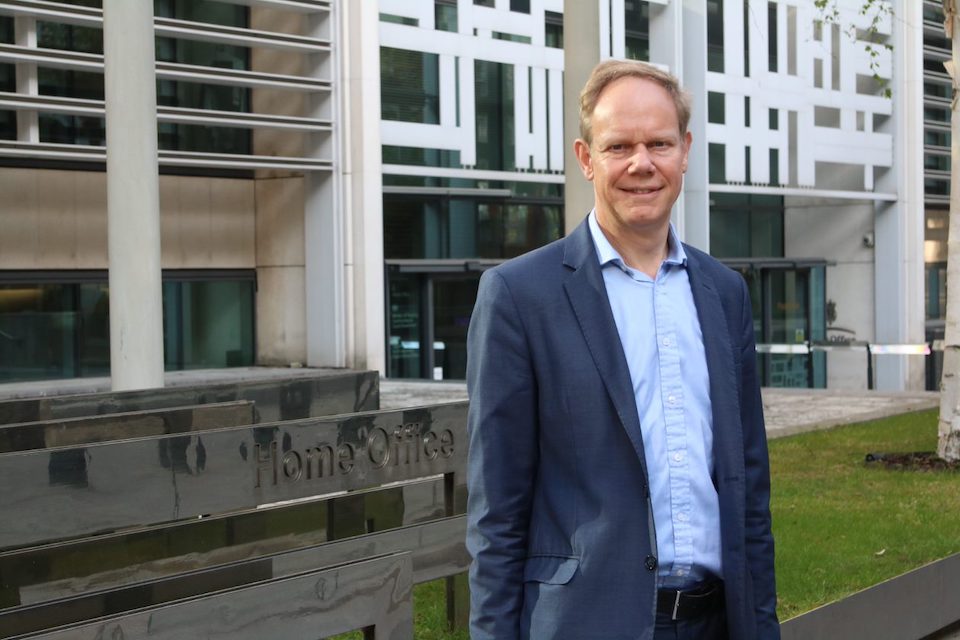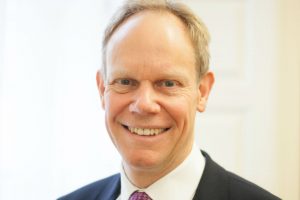
Matthew Rycroft, Permanent Secretary at the Home Office, reflects on the diversity of faith and belief communities celebrating and observing religious holidays and festivals during the pandemic, as the new Civil Service Faith and Belief Champion.
I am delighted to be taking on the Faith and Belief Champion role for the Civil Service from Clare Moriarty. As with my cross-Civil Service Race Champion role, it is a fantastic opportunity to learn more about faiths and belief and to champion the diversity which is at the heart of our Brilliant Civil Service.
Testing time
The last 12 months of the pandemic have been a testing time for everyone. What has struck me has been the way so many people have found strength in their faiths and belief; not only to get through it themselves but also to reach out and help others at work or in their community who are feeling isolated or going through a tough time.
Sense of community
Usually, the sense of community and togetherness would be an obvious feature of the various religious festivals observed during the last month or so – whether it’s Easter Sunday service, Jewish families observing Passover together, the colourful festivities of Holi, the processions of Vaisakhi, or the night prayers during Ramadan.
Sadly, I know that COVID-19 and the effects of lockdown have been hugely challenging for faith and belief communities the length and breadth of Britain, either during the closing of places of worship as in the first lockdown or imposing strict rules of attendance and social distancing since then. But each community has found its own way to carry on, for example through online congregations or volunteer work to support the most vulnerable in our society.
This resilience is a feature of the Civil Service too, and so many of our colleagues have found strength from networks of colleagues who come together because of their shared faith or belief.

So, in that context, what do I hope to achieve as Faith and Belief Champion? Firstly, I want to raise awareness of the experience in the workplace of those who have a faith or belief. What is the evidence telling us and are we using that evidence in the most effective way to encourage the diversity of thought that we know leads to better outcomes for the people we serve?
Secondly, as Alex Chisholm recently set out in his announcement of the role of Civil Service Inclusion Champions, I’ll be working in a team with the other Permanent Secretary champions to focus in particular on the theme of recruitment through multiple lenses, including faith and belief and race. What is our shared experience telling us about how we as a Civil Service recruit and retain people of different races, faiths and beliefs? And what more can we do to ensure our recruitment and retention practices are inclusive?

I’d be interested to hear your views on how the pandemic has impacted how you practise your faith or belief. What is your lived experience as a person of faith, belief or no belief working in today’s Civil Service and how do you think we can improve how we recruit and retain people to create a more inclusive Civil Service for everyone?
I’m building my own knowledge of these areas by attending events hosted by the different faith and belief networks and discussing their priorities for the year ahead. Together we can identify the actions that will make the biggest difference, then get on and do them.

18 comments
Comment by Anon posted on
Hello, I wish you a warm welcome and I hope you find this role interesting.
While I am religious, I do concur that philosophical beliefs have been underrepresented in various discourse, and using the legal (HRA)term 'Religion and Belief' (you can have both) should be preferred.
I also wish better guidance is issued - for instance the Civil Service adopted the IHRA Definition of Antisemitism in 2016, and I appreciate that it is both religious and racial in nature, but it is a policy, not legal requirement, so it is not clear how to implement it alongside the Equality Act 2010 - more obvious guidance is needed please?
This was the comms: https://www.gov.uk/government/speeches/a-definition-of-antisemitism
Comment by Shuhab Hamid posted on
Matthew - congrats on your another new role!
My experience as a practicing Muslim; has shown me just how as a multi faith community we have adapted, evolved and for many gone back to the basics. With patience, resilience and guidance we all have amazing stories of faith, belief and decree to certainly tell our children and grandchildren.
Comment by Eruvwu Obuaya posted on
Congratulations on your appointment.
I am grateful to God for his mercy and protection for me and my loved ones and for being part of an adapting community of believers reaching out and supporting each other and the wider community. I am also grateful that I became employed by HMRC during the pandemic, all of which I see God's hand, care and protection.
Comment by Adrian Wright posted on
Hi Matthew
I hope you are enjoying your new role.
I noticed on the news this morning that the Government has outlined plans to strengthen freedom of speech in universities in England.
It is a basic human right to be able to express ourselves freely. This includes the right to articulate views with which others might strongly disagree.
Naturally - and rightly - the legal right to freedom of expression stops short of allowing hate speech and the incitement of violence or other criminal acts.
Religion or Belief is one area where freedom of expression is often suppressed for fear of causing "offence" to believers.
I would be interested to hear how you intend to broaden the range of voices that we hear in the Civil Service, to include the views of people with negative personal experiences or with reasoned criticisms of religious or other beliefs.
Although my personal views veer towards the "anti-theistic", I have always found it possible to engage in polite and constructive dialogue with religious colleagues. Indeed, I think such dialogues should be encouraged, but it does require all parties to agree not to be offended.
My view is that Civil Servants should be trusted to exercise freedom of expression in a responsible manner, but this would require something of a cultural shift within the Civil Service. I can't see any good reason why the Civil Service should not voluntarily adopt similar standards to those being proposed for universities. This would undoubtedly help to encourage the diversity of thought to which you refer in your blog article.
I would therefore be very interested to hear your thoughts on freedom of expression in the Civil Service.
I wish you all the best.
Comment by Tim Johnston posted on
Adrian, as a Christian I would welcome the kind of discussion you suggest. As Subrata says in a different comment, at FSA we have a very open Faith And Belief network, where members are paired with people of a different faith or none for a one-to-one chat. My chat with Sub was really enjoyable and very enlightening, as was my chat with the Agnostic on the group (it is a fairly small group).
The only criteria needs to be it needs to happen in a spirit of enquiry, rather than to prove someone else wrong.
Comment by Adrian Wright posted on
Hi Tim - You make some interesting points. I'm actually quite happy for people to try and prove me wrong, as just occasionally they might say something that leads me to tighten up my thinking on a subject (including subjects other than religion). But I suppose that would count as a "debate" rather than a "conversation"! I think where one-to-one chats are good is in finding the things people have in common despite the differences in their world views.
Comment by Subrata Dey posted on
Hello Adrian
I agree with you that "Religion or Belief is one area where freedom of expression is often suppressed for fear of causing "offence" to believers." I think that the fact that religion and belief are protected characteristics in the Equality Act 2010 makes people reluctant to engage in freedom of expression in this area.
Coming from a Hindu background, I am familiar with the spirit of enquiry and philosophical and religious debate that prevailed in ancient India, not with the intention to undermine others but to delve deep into reasoned arguments. In my opinion, there should be freedom of expression, within civil limits, when it comes to religion and belief, if anything so that religions and belief systems can respond to the challenges posed by modernity.
Comment by Adrian Wright posted on
Hi Subrata - Part of the problem is that, even within a single religion, people have different perceptions of what is or isn't offensive. Somebody might make an observation or ask a question about a particular religion which most believers of that religion would accept as interesting or legitimate - they might even feel they can give a good response to it. But if there is a risk of even a small handful of believers in that religion being offended, the precautionary principle is likely to apply, particularly in the workplace.
I think we do need to hear more dissenting views on religion to counterbalance the one-sidedly positive experiences we hear about, but the question is how to do this - hence my comment on Matthew's blog article.
Comment by Chris Houlden posted on
Compliments on the appointment Matthew, I hope it’s a role you’ll enjoy.
Quote: "I want to raise awareness of the experience in the workplace of those who *have* a faith or belief."
Although your blog focuses on how people practise their faith, I don't believe you intentionally excluded those without a religious belief. Religion has a long-held position of privilege and, because of this, non-believers can feel unable to be their whole self at work. It's a shocking statistic that the UK ranks 84th out of 133 countries for freedom of thought, so there's a lot of work to do. I'm encouraged that you have already spoken to reps of Humanists in Government and look forward to hearing about the progress you make.
Comment by Alison Roder posted on
Matthew - congratulations on your appointment.
One thing I would say in relation to the topic of 'religion and belief' is that it is almost always interpreted as being a reference to 'religion and religious belief'. I see that there has been a contribution from a vegan already - it is important to note that the 'belief' part refers to people who hold non-religious beliefs - the Equality Act 2010 gives these equal status in terms of protection.
I am a humanist working in MoJ and recently set up and became chair of 'Humanists in MoJ (HiMoJ)'. I am grateful for MoJ HR in responding positively to this request and making this commitment to equality. However, I am sadly aware that most requests to create humanist networks in other departments on parity with faith networks have been refused. I would be very grateful if in your role you could raise awareness around the 'belief' part of religion and belief - in particular humanism, which is the dominant belief system for the non-religious and has the principle of universal equality at its core.
Staff working in departments which do not currently have humanist networks can join Humanists in Government (a cross-civil service network). Non-religious people unfamiliar with the term, can find out more from the Humanist UK website - there's a very good 5 minute video presented by Stephen Fry.
Comment by Miriam Mokal posted on
Hello Alison, you make an excellent point. Often it seems it's only the major faiths which are included in these sorts of discussions (not always, but often). I try and follow the philosophy of Buddhism myself with a bent towards humanism, and its encouraging that you have set up a Humanist Network. Whilst "Religion" and "Faith" can often be a thorny issue (and often divisive) it is vital that people who don't fall into those boxes as such also have a voice to be able to contribute to the conversation. Thanks for your comment.
Comment by Subrata Dey posted on
Congratulations, Matthew, on your appointment as Faith and Belief Champion, and thank you for sharing your thoughts about your new role.
I am a Hindu and the pandemic has allowed me to connect with the more introspective forms of worship that Hindu Dharma teaches, such as meditation and contemplation. This has helped me cope with anxiety by providing calmness and perspective. We've also held many on-line well-being sessions that have reached a wider audience than face-to-face sessions had done pre-pandemic.
I think that this is an exciting time for people of faith and belief in the civil service. Faith and belief staff networks are growing across Departments and there is also evidence of collaboration between networks, which is really good. I'm on the Food standards Agency's Faith and Belief Network, which we started last year. Our network is thriving, and we have held discussions with another Department about how we can collaborate.
I'm also on the Executive of the civil service's Hindu Connection Network. In terms of your remit of looking at recruitment and retention through the faith and belief lens, we are planning on working with external faith groups and schools so that we can promote the civil service as a career of choice. We'll let you know if we are able to make progress with this!
Your reference to diversity of thought is very interesting because I think this can be developed so that the timeless values of faiths can inform policy-making and implementation in the civil service.
Comment by Peter King posted on
Thank you for this blog. I hope in your series of meetings you will be meeting at some stage with the group of Faith and Belief Champions across Government. We had some very useful meetings of this group under Clare's chairmanship and since she left I have been acting as a sort of informal convenor of the group (I am the Faith and Belief Champion for the Government Legal Department). I would be happy to talk to your office about convening such a meeting with you.
Comment by Lisa Fraser posted on
Thank you for sharing. I shall pray for you, and for the faith networks
Comment by Gavin Thomas posted on
Congratulations on your appointment as Champion.
I am Christian who for a short while lost my way in terms of my faith, but then rediscovered it during my posting to Istanbul.
I use to enjoy my attendance at the Sunday morning services at Christ Church, as it gave me the opportunity to meet some pretty amazing people. It also gave me the chance for some personal reflection, and in particular the way that I behaved towards others and the importance of being inclusive.
Unfortunately, upon my return the UK I have not been able to attend our local church on a regular basis because of my engagement with a local voluntary group who maintain our local Heath.
I did however attend a special service held in December 2019 that was held for blessing our pets and sought to keep in touch with the church online.
Comment by Linda Haskew posted on
As a Christian, my church has luckily been able to switch to online services, so we are able to worship and receive teaching. Watching the service online has meant I can still sing along, also Departmental Carol services and lots of similar things are online, I have been able to attend those where normally I couldn't travel to them. I've been able to attend lots of Christian in government sessions too so I am having fellowship with a much greater number of people of a greater diversity of backgrounds which has been fantastic. I am mindful that if people did not have the means to connect via internet, they would have been more isolated, so phoning people regularly had been important too. Of course, our faith is more than attending church and having fellowship with other Christians, it is reaching out to the lonely/and those self-isolating and those who have suffered hardship during the pandemic. There have been lots of opportunities there too. I know that people across all faiths and none have been very active in their community to help each other out and this is not limited to Christian activity.
Comment by Eruvwu Obuaya posted on
Hi Linda, I enjoyed reading and can relate to your experience and observations. Thanks for sharing.
Comment by Andy Bartram posted on
Hi Matthew and congratulations on this new role.
I've been an ethical vegan for 21 years and was delighted to hear that it's now a philosophical belief that's protected against discrimination under the Equality Act 2010.
Generally, I don't mention I'm vegan unless asked or there's a need to explain - for example, when out for a meal with colleagues. Almost always, colleagues are really respectful but occasionally, and recently, I've received some mocking, disrespectful comments.
I should stress these haven't been in response to anything other than my explaining that I'm vegan to contextualise an experience I had.
I responded in a friendly way, brushing it off as a joke but I did feel a bit uncomfortable.
I'm sure the person didn't mean any harm and I wasn't offended or upset: it just made a situation awkward.
So it'd be great to see some recognition that ethical veganism is now a protected belief, as I don't think this is widely known.
I'd be very happy to write an article if that would help.
Many thanks
Andy